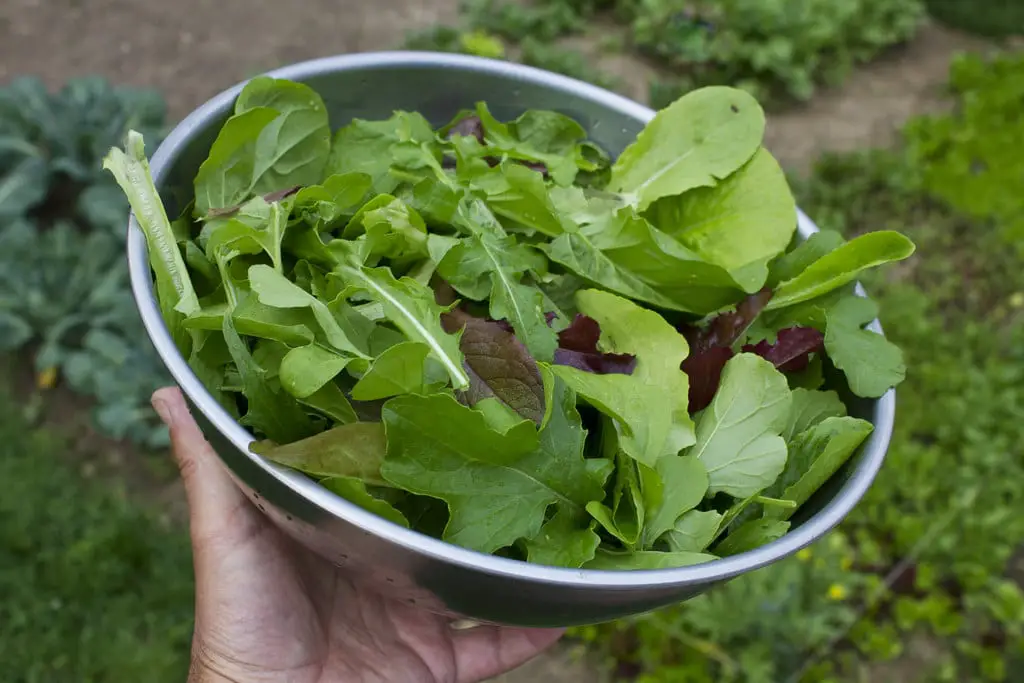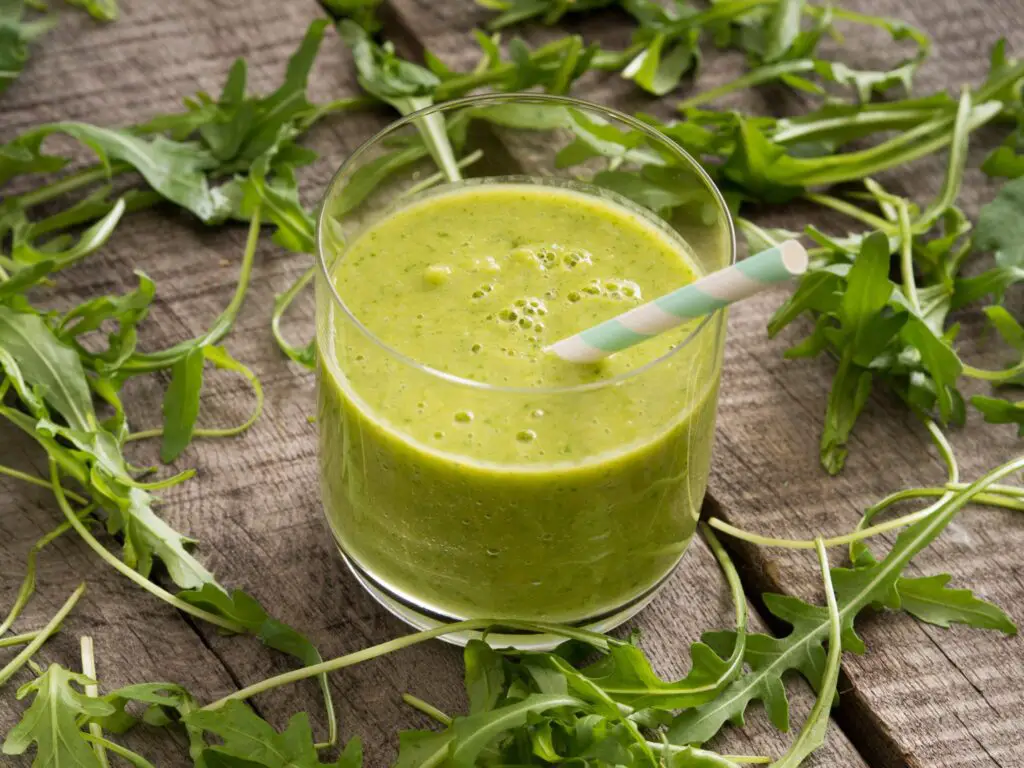Introduction
Is Arugula Good For Weight Loss: Arugula is believed to support weight loss is its exceptional fiber content. Dietary fiber, found abundantly in arugula, can promote feelings of fullness and satiety, which may reduce overall calorie consumption. Fiber aids in regulating digestion and promoting a healthy gut microbiome, factors that can indirectly influence weight management.
Arugula’s potential to aid weight loss can also be attributed to its low calorie density. It offers a substantial volume of food with relatively few calories, allowing individuals to fill their plates without excessive calorie intake. This characteristic makes it an excellent choice for those looking to control their portion sizes while still enjoying satisfying meals. Arugula is a versatile ingredient that can be incorporated into a wide range of dishes, from salads to sandwiches and even smoothies.
Its peppery taste can add a burst of flavor to meals, making them more enjoyable and potentially reducing the desire for calorie-laden, less nutritious options. While arugula alone cannot be a magic solution for weight loss, it can certainly be a valuable component of a balanced diet aimed at shedding pounds. In this exploration of arugula’s potential benefits for weight management, we will delve deeper into its nutritional profile, research findings, and practical tips for including it in your meals to help you on your weight loss journey.

Does arugula help you lose weight?
Supports Weight Loss
Arugula is a low-calorie vegetable, making it a good choice for those on a diet. It only has about 25 calories per 100 g serving. Most importantly, the fewer carbohydrates and good amount of fibre in arugula positively affect any attempts at weight loss.
Low-Calorie Density: Arugula is a low-calorie food, meaning it provides few calories relative to its volume. This can be advantageous for weight loss because you can consume a larger portion of arugula while keeping your calorie intake in check.
Dietary Fiber: The fiber in arugula can help promote feelings of fullness and reduce overall calorie consumption. By incorporating arugula into meals, you may be less inclined to overeat on calorie-dense foods.
Nutrient Density: Arugula is rich in essential nutrients, ensuring that you receive necessary vitamins and minerals even when reducing calorie intake to shed pounds. This can help you maintain overall health while losing weight.
Hydration: Arugula has a high water content, which can aid in hydration. Proper hydration is essential for overall health and can also help control appetite.
Is it OK to eat arugula every day?
Three cups of arugula daily will supply you with 100 percent of your bodies need of vitamin K. It also contains eight times more calcium than iceberg lettuce. It contains indole-3-carbinol and isothiocyanates, which have been shown to suppress the production of inflammation in the body.
Low in Calories: Arugula is a low-calorie food, making it an excellent choice for those looking to manage their weight or reduce calorie intake.
Rich in Nutrients: Arugula is packed with vitamins and minerals, including vitamins A, C, K, and several B vitamins. It also provides essential minerals like calcium, potassium, and folate.
Dietary Fiber: It contains dietary fiber, which aids in digestion and promotes a feeling of fullness, potentially helping with weight management.
Antioxidants: Arugula is a source of antioxidants such as beta-carotene and flavonoids, which combat oxidative stress and inflammation in the body.
Hydration: With a high water content, arugula contributes to your daily hydration needs, helping maintain overall health.
What are the negatives of arugula?
Although consuming arugula in optimum quantities may have quite a few beneficial effects, over consumption of anything can take a toll on your health. Some of the short-term side effects of arugula include flatulence and abdominal cramping and discomfort.
Oxalates and Kidney Stones
Arugula, like many leafy greens, contains oxalates, which are naturally occurring compounds found in plants. Oxalates can crystallize in the body and may contribute to the formation of kidney stones in susceptible individuals. Those with a history of kidney stones or a tendency to develop them should moderate their intake of oxalate-rich foods like arugula.
Thyroid Health
Arugula, being a member of the cruciferous vegetable family, contains substances known as goitrogens. Goitrogens can interfere with the proper functioning of the thyroid gland by inhibiting iodine uptake, potentially affecting individuals with thyroid conditions. While the levels of goitrogens in arugula are relatively low compared to other cruciferous vegetables, those with thyroid issues may want to consume it in moderation and consult their healthcare provider.
Potential Allergies
Some individuals may be allergic to arugula, although such cases are rare. Allergic reactions can manifest as skin rashes, itching, or, in severe cases, difficulty in breathing. If you experience any adverse reactions after consuming arugula, it is advisable to discontinue its consumption and consult a healthcare professional.
Pesticide Residue
Like many conventionally grown vegetables, arugula may contain pesticide residues, which can pose health risks if consumed in excessive amounts. To mitigate this risk, it is to wash arugula thoroughly or opt for organically grown arugula, which is cultivated without synthetic pesticides.
What is the healthiest way to eat arugula?
Arugula is delicious raw, and it can be used as a healthy add-on topping for pizza, nachos, sandwiches, and wraps. It can be served as a side salad with nothing more than a drizzle of extra virgin olive oil, salt, and pepper. It also makes an excellent base for more substantial salad recipes.
Fresh in Salads
Arugula’s tender leaves make it an ideal candidate for fresh salads. To create a healthy arugula salad, combine it with a variety of colorful vegetables like tomatoes, bell peppers, cucumbers, and carrots. Add a source of lean protein such as grilled chicken, tofu, or chickpeas for a satisfying and balanced meal. Top it off with a simple vinaigrette made from olive oil, balsamic vinegar, Dijon mustard, and a touch of honey for added flavor.
Nutrient-Packed Smoothies
Arugula can be blended into smoothies to boost their nutritional content. Combine a handful of arugula with fruits like berries, bananas, and a splash of Greek yogurt or a dairy-free alternative. The peppery taste of arugula pairs surprisingly well with the sweetness of fruits. This is an excellent way to get a dose of vitamins and minerals in a convenient, drinkable form.
Sauteed or Wilted
For a warm side dish or ingredient in cooked meals, lightly sauté or wilt arugula. Heat a small amount of olive oil in a pan, add minced garlic for flavor, and then toss in the arugula until it wilts down. Season with a pinch of salt and a squeeze of lemon juice. This quick cooking method retains the nutritional value while offering a slightly different texture and taste.
As a Pizza Topping
Use arugula as a pizza topping to add a fresh, peppery contrast to the richness of melted cheese and other ingredients. After the pizza has come out of the oven, sprinkle arugula leaves on top for a vibrant finish. This way, you can enjoy the benefits of arugula even in an indulgent treat like pizza.
Is it OK to eat a lot of arugula?
There’s little to suggest arugula is bad for you. But if you take medicine known as blood thinners, too much vitamin K could undo their effects. That’s because vitamin K is important to the blood-clotting process.
Rich in Nutrients: Arugula is a nutritional powerhouse, containing vitamins A, C, K, and several B vitamins, along with essential minerals like calcium, potassium, and folate.
Low in Calories: It is a low-calorie food, making it an excellent choice for those aiming to manage their weight and calorie intake.
Dietary Fiber: Arugula provides dietary fiber, which aids digestion and promotes feelings of fullness, potentially assisting with weight management.
Antioxidants: Arugula contains antioxidants, including beta-carotene and flavonoids, which combat oxidative stress and inflammation in the body.
Is spinach better than arugula?
While both spinach and arugula provide valuable nutrients, spinach tends to have a higher iron content, making it a great choice for those seeking to boost their iron intake. Arugula, on the other hand, is lower in calories and carbohydrates, making it a suitable option for those watching their calorie intake.
Calories and Macronutrients
Spinach: Spinach is very low in calories, making it an excellent choice for those looking to manage their weight. It’s also a good source of protein, fiber, and carbohydrates.
Arugula: Arugula is even lower in calories than spinach, which can be beneficial for calorie-conscious individuals. It contains less protein and carbohydrates than spinach.
Vitamins and Minerals
Spinach: Spinach is a nutritional powerhouse, rich in vitamins A, C, and K, as well as folate, iron, and calcium.
Arugula: Arugula is particularly high in vitamin K and also provides a good amount of vitamins A and C, calcium, and potassium.
Antioxidants
Spinach: Spinach contains various antioxidants, including lutein and zeaxanthin, which are beneficial for eye health.
Arugula: Arugula is known for its unique blend of antioxidants, such as beta-carotene and flavonoids, which help combat oxidative stress and inflammation.
When should I eat arugula?
Though you can get arugula year-round at a grocery store, it typically lasts the longest and tastes the best when grown in season during the spring and fall, Glass explains. This is because it’s picked at its peak freshness and doesn’t need to be shipped far before it hits your kitchen table.
Breakfast
Arugula Smoothie: Start your day with a nutritious arugula smoothie. Blend a handful of arugula with fruits like berries, bananas, and a bit of yogurt or almond milk. This morning boost provides vitamins, minerals, and energy to kickstart your day.
Arugula Omelet: Add arugula to your morning omelet or scrambled eggs for a savory and vitamin-packed breakfast. It pairs well with tomatoes, onions, and feta cheese for a delightful morning meal.
Lunch
Arugula Salad: Enjoy arugula as the base of a vibrant salad. Combine it with a variety of fresh vegetables, lean protein sources like grilled chicken or chickpeas, and a flavorful vinaigrette. A hearty arugula salad makes for a satisfying and nutrient-dense lunch.
Arugula Wrap or Sandwich: Use arugula leaves to add a peppery kick to your lunchtime wraps or sandwiches. It complements roasted vegetables, turkey, or hummus, creating a healthy and tasty midday meal.
Dinner
Sautéed Arugula: For a warm side dish, lightly sauté arugula in olive oil with garlic and a squeeze of lemon juice. This simple preparation retains the nutritional value of arugula and adds a refreshing element to your evening meal.
Arugula Pesto: Create a homemade arugula pesto sauce to toss with whole-grain pasta or use as a topping for grilled chicken or fish. The peppery flavor of arugula can enhance the taste of your dinner dishes.
Is arugula a blood thinner?
Arugula contains vitamin K, a fat-soluble vitamin that helps your blood clot normally. Blood thinners work by limiting blood clotting activity in the body, consuming a lot of vitamin K might work against and limit the effects of your medication (3).
Arugula and Vitamin K
One of the key factors to consider when discussing blood thinning is the role of vitamin K. Vitamin K is a fat-soluble vitamin that plays a crucial role in blood clotting by assisting in the production of clotting factors. For individuals taking blood-thinning medications like warfarin (Coumadin), it’s essential to maintain consistent vitamin K intake to ensure the effectiveness of their medication.
Arugula, like other leafy greens, contains vitamin K. However, its vitamin K content is relatively low compared to certain greens like kale and spinach. If you are on blood-thinning medication, it’s important to be mindful of your vitamin K intake and maintain consistency in your diet. While arugula’s vitamin K content is not exceptionally high, it is still a source to consider in your overall diet plan.
Arugula’s Potential Benefits
Arugula is rich in dietary nitrates, which can have a vasodilatory effect, meaning they may help relax blood vessels and improve blood flow. This potential vasodilation can contribute to cardiovascular health by reducing blood pressure and potentially lowering the risk of clot formation. However, this effect is not the same as blood thinning, as it does not directly influence the clotting factors in your blood.
Balancing Arugula in Your Diet
If you are on blood-thinning medication or have concerns about blood clotting, it is advisable to consult your healthcare provider, who can provide personalized guidance on your diet and medication management. They may recommend consistent vitamin K intake or adjustments to your medication based on your dietary choices.

Conclusion
Arugula’s nutrient profile is nothing short of impressive. It delivers essential vitamins and minerals, such as vitamins A, C, and K, as well as folate, which are crucial for maintaining good health while on a calorie-restricted diet. These nutrients ensure that individuals receive necessary nourishment even as they reduce their calorie intake. Another compelling aspect of arugula is its versatility. This leafy green can be incorporated into a multitude of dishes, enhancing their flavor and nutritional value.
Whether used in salads, sandwiches, omelets, or smoothies, arugula’s peppery taste can make healthier meals more enjoyable and satisfying, reducing cravings for less nutritious alternatives. While arugula alone won’t work miracles in terms of weight loss, it plays a significant supporting role in achieving and maintaining a healthy weight. Combining arugula with other nutrient-dense foods and adopting a well-balanced diet and regular exercise routine is essential for sustainable and effective weight management.
Arugula’s reputation as a weight loss-friendly food is well-deserved. Its low-calorie, high-fiber, and nutrient-rich qualities make it a valuable asset in the pursuit of a healthier weight. By embracing arugula as part of a comprehensive approach to nutrition and wellness, individuals can harness its benefits and work toward their weight loss goals while savoring delicious, satisfying meals.

